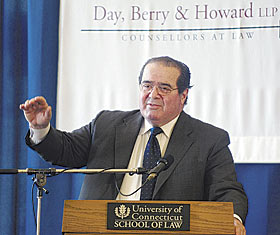  |
| HOME | THIS ISSUE | CALENDAR | GRANTS | BACK ISSUES | < BACK | NEXT > |
Scalia tells law students Constitution ‘cannot bend’by Michael Kirk - April 17, 2006
|
||||
|
Joking that he goes to law schools to “make trouble,” U.S. Supreme Court Justice Antonin Scalia spoke out against what he called “judge-moralists” in an address on his judicial philosophy to 350 guests at the School of Law on April 12. The talk was sponsored by the Hartford firm of Day, Berry and Howard, as well as the Connecticut Law Review. Scalia taught two classes with UConn students the day before at the law school as a “Distinguished Scholar and Jurist in Residence.” During the hour-long appearance, Scalia described himself as a constitutional “originalist,” based on his view that the Constitution is a rigid document that cannot bend to include new rights for Americans or to address social ills. He criticized judges, including his own Supreme Court, for viewing it as a “living” document, which he said is a fairly new phenomenon. “We have become addicted to abstract moralizing,” Scalia said. “A change occurred in the second half of the 20th century, and I’m sorry to say my court was responsible.” Scalia, described by many as a conservative, touched on what he called “moral” issues that are some of the more controversial topics in the American judicial and political scenes: abortion, same-sex marriage, assisted suicide, and the death penalty. He said the framers intended the Constitution to be interpreted the same way today as when it was written, and he criticized those who suggested that interpretation of the Constitution can and should change and expand through time. He cited the 1973 Roe vs. Wade decision, which legalized abortion in the U.S., as a prime example of a “value-laden judgment.” “Belief in the expert has been replaced by judge-moralists,” said Scalia, who suggested that there are no moral experts to provide the right answer on moral issues. “[The framers] obviously meant to set some standards,” he said. “You can’t do that by saying these words are empty bottles to be filled by future generations.” Scalia also discussed the role of politics in judicial nominations. He said presidential administrations and Congress have come to look for nominees not based on experience or ability, but whether they are in line politically with those nominating and confirming them. “I’m not happy about the intrusion of politics into judicial nomination,” he said, “but frankly, I’d prefer it to the alternative, which is government by judicial aristocracy.”
Scalia said he takes issue with those who would prefer to see nominees for the courts with a moderate interpretation of the Constitution. “What in the world is a moderate interpretation of the Constitution?” he asked. “Halfway between what it says and what you’d like it to say?” Scalia took questions at the end of his talk, which were submitted beforehand and read by UConn law professor Paul Schiff Berman. One question involved when justices should recuse themselves from a case. Scalia cited a 2004 case involving Vice President Dick Cheney. At the time, it was suggested that Scalia should recuse himself because he and Cheney were friends. Scalia stood by his decision not to step aside. “The proudest thing I did on the bench was not to allow myself to be chased off the case,” he said. When asked about building consensus with other justices, he said he has come under fire for not being able to do so often enough. He defended himself saying, “An originalist is not a good consensus-builder, because an originalist can not compromise.” When asked whether Supreme Court hearings should be filmed for television, he said, “It would not educate the American people; it would misinform them.” “The opportunity for our students to hear directly from a sitting justice on the U.S. Supreme Court is a very special experience,” said Nell Newton, dean of the law school. Said Berman, “Justice Scalia was, as usual, a provocative speaker, and his visit galvanized students of all political views on campus in a way that I think is ultimately very productive.” |
| ADVANCE HOME UCONN HOME |

